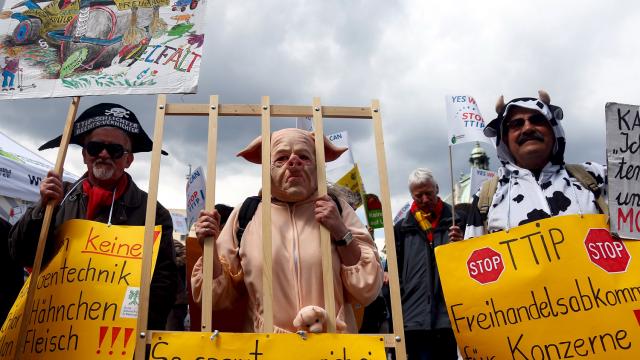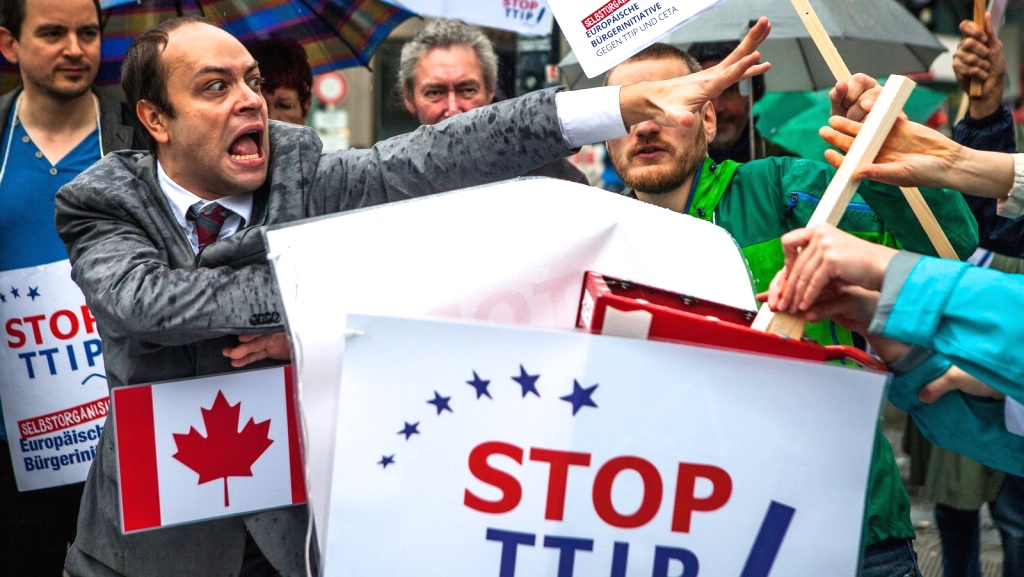
BERLIN — The tide of public resistance against a proposed free trade agreement between the U.S. and the European Union is rising in Germany, as opponents become more firmly entrenched, insisting that the plan would harm democracy and rule of law.
Around 43 percent of Germans say the Transatlantic Trade and Investment Partnership (TTIP) would be bad for the country, according to a recent poll by market research company YouGov. Only 26 percent think the country would benefit from it.
Residents of other European countries appear to feel less negatively about the agreement. In France, one in three think the country would lose out, while in Great Britain it’s only one in five. "The more people know about TTIP, the more they are against it," explained Lena Blanken, a consumer rights activist with Berlin-based Foodwatch, a consumer protection organization. "In other European countries there is not yet such a broad and controversial public debate as in Germany — that’s why the opposition is the biggest here."
TTIP has been somewhat controversial in the U.S. due to the efforts of grassroots activists, labor unions and left-of-center democrats like Sen. Elizabeth Warren, who claim it will undermine American workers. On May 12, Warren and other democrats in the senate were instrumental in blocking legislation that would fast track approval of the Trans-Pacific Partnership, a related free trade deal affecting Pacific rim nations. The Democrats have said they won’t support fast tracking the agreement without stronger labor protections and prohibitions against unfair trading practices. Since then, they’ve appeared to reach an agreement to support fast track with some of the provisions, but have yet to vote on a final bill.
A similar divide runs through Germany. Like President Barack Obama, German Chancellor Angela Merkel claims TTIP will grow the economy on both sides of the Atlantic.
"A free trade agreement between the two big economies will lead to more jobs," Merkel told German media recently, adding that Germany as a major exporting nation depended on strong international partnerships. But many of Merkel’s constituents are suspicious of those claims, saying the deal would weaken European democracy, give multinational corporations too much power and undermine the continent’s strict food and environmental protection standards.
Although details of the ongoing negotiations between American and European representatives have yet to be made public, both sides have said TTIP would remove trade barriers between the E.U. and the U.S., including import and export tariffs and regulations on foodstuffs, chemicals and labor laws.
TTIP advocates say that the agreement could bring the E.U. $133 billion a year and the U.S. $106 billion a year in additional commerce once it’s fully implemented.
But despite Merkel’s backing, many Germans believe the disadvantages of TTIP outweigh the benefits. American food companies often face resistance in Europe because their genetically modified products must be labeled under European laws, for example.
"Germans don’t buy these products because they don’t trust GM technology," said Karl Bär, an activist with the environmental organization Umweltinstitut in Munich. “Now people fear that GM food might end up on their plates if the E.U. makes some compromise that would allow companies to sell their genetically modified products without labeling it — a point that the E.U. denies is even up for discussion.”
In January, however, a suggestion by U.S. representatives to end labeling but include information about genetically modified ingredients in the bar codes of European food products made headlines in Germany. Consumers would be able to scan bar codes with their smartphones to know whether the product contains any genetic modification, reports said.
"This is proof that the topic is part of the negotiations," said Bär, who nevertheless called the proposal a "catastrophe" because it would weaken German standards.
The bar code proposal exemplified the secrecy of the ongoing trade negotiations, said Blanken. "The negotiations are totally un-transparent," said Blanken. "Most of the details we know we learned through leaked documents."
Blanken also lambasted the proposed Regulatory Cooperation Council, where European and U.S. officials could share information on planned regulations and give the other party a chance to comment on them.
"The proposed Regulatory Councils are one of the biggest threats to democracy included in the TTIP," said Blanken. "Laws could be delayed and watered down."
Blanken and other activists have scored at least partial victories. In TTIP negotiations, a proposed "investor state dispute settlement" (ISDS) would allow corporations to dispute laws and regulations that could potentially hurt their profits in corporate-controlled international arbitration panels.
Germany’s Mittelstand — a group of small and medium-sized businesses that are the backbone of the German economy — claim the settlement mechanism only benefits big companies that have the financial resources to engage in long arbitration proceedings. After a public outcry against the settlement mechanism, German officials proposed an independent E.U.-U.S. trade court that would consist of nine appointed, impartial judges to handle investor disputes.
Because E.U. officials and not German politicians are handling the negotiations with the U.S., it’s unclear if the court proposal will be adopted.
Germany’s Green Party and other opposition lawmakers are aware that national politicians have little to no influence on TTIP negotiations, and that protests need to be pan-European. Therefore, they joined forces with opponents in several other European countries to create the Stop TTIP initiative.
Spearheaded by German organizations, more than 460 NGOs from throughout Europe collected signatures for a European Citizen’s Initiative, or ECI, a legal maneuver that would allow E.U. citizens to directly call on the European Commission to propose alternatives to the ISDS.
Stop TTIP successfully collected the benchmark of 1 million signatures for the ECI and presented their results to the European Commission in October. But commissioners rejected the idea on "obscure" technical grounds, said Stop TTIP campaigners.
The European Court of Justice is currently deciding whether or not the Commission lawfully rejected the Initiative. Stop TTIP is now collecting signatures for an unofficial ECI that they hope to present to the Commission in October. Around 1.7 million people across Europe have already signed the online petition so far.
TTIP opponents are hopeful the agreement will go the way of the Anti-Counterfeiting Trade Agreement, or ACTA, an international deal that ostensibly would protect intellectual property but would also likely undermine Internet privacy and freedom. In 2012, mass demonstrations helped persuade global leaders to slow down ratification of ACTA, which has since languished in parliaments around the world.
“ISDS is and will remain a threat to the rule of law and democracy — no cosmetic surgery can change this,” Michael Efler, a member of Stop TTIP’s Citizens’ Committee, said in a statement. “A renegotiation of this agreement is absolutely necessary if we want to eliminate the dangers of a private parallel justice.”
3 WAYS TO SHOW YOUR SUPPORT
- Log in to post comments














